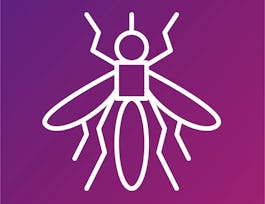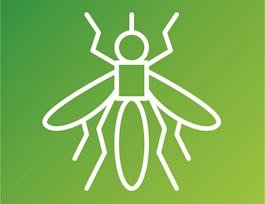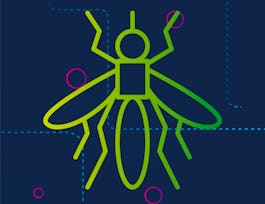Compartmental modelling is a cornerstone of mathematical modelling of infectious diseases and this course will introduce some of the basic concepts in building compartmental models, including how to interpret and represent rates, durations and proportions. You'll learn to place the mathematics to one side and concentrate on gaining intuition into the behaviour of a simple epidemic, and be introduced to further basic concepts of infectious disease epidemiology, such as the basic reproduction number (R0) and its implications for infectious disease dynamics. To express the mathematical underpinnings of the basic drivers that you study, you'll use the simple SIR model, which, in turn, will help you examine different scenarios for reproduction numbers. Susceptibility to infection is the fuel for an infectious disease, so understanding the dynamics of susceptibility can offer important insights into epidemic dynamics, as well as priorities for control.



Developing the SIR Model
This course is part of Infectious Disease Modelling Specialization

Instructor: Nimalan Arinaminpathy
Sponsored by PTT Global Chemical
11,410 already enrolled
(267 reviews)
What you'll learn
Construct valid mathematical models capturing the natural history of a given infectious disease
Interpret compartmental models in terms of rates, proportions and delays
Describe the fundamental processes driving the dynamics of an SIR epidemic and show their relation to important concepts
Explain mechanisms by which susceptibility can change over time and develop a simple SIR model to account for these under given parameters
Details to know

Add to your LinkedIn profile
1 assignment
See how employees at top companies are mastering in-demand skills

Build your subject-matter expertise
- Learn new concepts from industry experts
- Gain a foundational understanding of a subject or tool
- Develop job-relevant skills with hands-on projects
- Earn a shareable career certificate


Earn a career certificate
Add this credential to your LinkedIn profile, resume, or CV
Share it on social media and in your performance review

There are 4 modules in this course
Compartmental modelling is a cornerstone of mathematical modelling of infectious diseases. You will be introduced to some of the basic concepts in building compartmental models, including how to interpret and represent rates, durations and proportions in such models. This work lays the foundations for modelling the dynamics of infectious disease transmission.
What's included
8 videos4 readings1 discussion prompt11 ungraded labs
You will be placing the mathematics to one side and concentrating on gaining intuition into the behaviour of a simple epidemic of a perfectly immunising infection in a stable population. You will also study further basic concepts of infectious disease epidemiology, including the basic reproduction number (R0), and its implications for infectious disease dynamics.
What's included
4 videos1 reading3 discussion prompts1 plugin
You will now consolidate the insights that you have gained over the past two modules to express the mathematical underpinnings of the basic drivers that have been examined. You will use the simple SIR model that you already developed in module 1 to examine different scenarios for reproduction numbers.
What's included
3 videos1 reading4 ungraded labs
Susceptibility to infection is the fuel for an infectious disease; understanding the dynamics of susceptibility can offer important insights into epidemic dynamics, as well as priorities for control. In this module, building on the basic SIR model that you have coded so far, you will cover three important mechanisms by which susceptibility can change over the course of an epidemic: (i) population turnover, (ii) vaccination, (iii) immunity waning over time. For simplicity, you will learn very simple approaches to modelling vaccination. In our subsequent courses in the Infectious Disease Modelling specialisation, you have the opportunity to cover more detailed approaches for capturing this important intervention.
What's included
4 videos1 assignment1 discussion prompt8 ungraded labs1 plugin
Instructor

Offered by
Why people choose Coursera for their career




Learner reviews
267 reviews
- 5 stars
89.88%
- 4 stars
7.86%
- 3 stars
0.74%
- 2 stars
0%
- 1 star
1.49%
Showing 3 of 267
Reviewed on Aug 31, 2020
Nice course, good balance of videos and independent work. I have a question! What coding language is used in the etivities? Please help - no replies on the forums sadly! Thanks
Reviewed on Jun 9, 2022
Great course if you want to start learning about the epidemiology of infectious diseases and how to code SIR models in R. Good job!!!
Reviewed on May 22, 2020
Excellent primer for SIR models. I had no background in this field but enjoyed the course. A good working knowledge of R will be helpfpul.
Recommended if you're interested in Health

Imperial College London

Johns Hopkins University

Imperial College London

Imperial College London

Open new doors with Coursera Plus
Unlimited access to 10,000+ world-class courses, hands-on projects, and job-ready certificate programs - all included in your subscription
Advance your career with an online degree
Earn a degree from world-class universities - 100% online
Join over 3,400 global companies that choose Coursera for Business
Upskill your employees to excel in the digital economy


